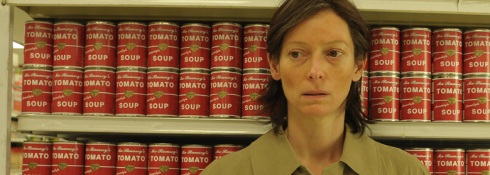The observant amongst you will have twigged that yesterday’s livewithfilm post materialised in the early hours of this morning. Whilst the blunder was down to a late night cinema trip in the name of the blog (more on this later), there is little that frustrates livewithfilm more than a 00:01am posting… Nevertheless, in completing possibly the most downbeat afternoon/evening of viewing imaginable, livewithfilm will be able to tick off another first: Lynne Ramsay’s We Need to Talk About Kevin shall become the blog’s first cinema review. Whilst livewithfilm would always condone a filmic double bill, the combination of Ramsay’s teen killer romp with Hunger’s examination of starvation was hardly a barrel of laughs. Whilst the pair are both interesting and powerful pieces of cinema, their consecutive viewings felt akin to self flagellation. Despondency and gloom encircled livewithfilm on his bike ride home last night. The only concession was that last time he checked, livewithfilm was neither an Irish prisoner on a hunger strike or the parent of a psychopath. Every cloud…
Based on the acclaimed book by Lionel Shriver, Ramsay’s We Need to Talk About Kevin is guided by Eva (Tilda Swinton), the mother of a high school killer. Enduring physical and verbal assaults from her neighbours, Eva must confront the violent actions of her son Kevin (Ezra Miller). Contending with the idea that it was her failure as a parent that led to his killing spree, Eva sifts through her memories of Kevin’s childhood, unearthing shocking recollections.
Ramsay’s film is master class in non-chronological filmmaking, relinquishing glimpses of information to the audience that ensure an unsettling mood. Whilst Eva is in complete control of the film, she is trapped within the ramifications of Kevin’s act. This is an interesting angle for the film to take as it remains a consistently subjective piece, relying on the mutable memories of the distraught mother. Thus the scenes of Kevin’s childhood seem to envision Eva’s psychological downfall rather than the transformation of her child into a killer. We Need to Talk About Kevin consequently holds a catalogue of carefully placed and skilfully recurrent symbols. Shades of red echo through the film and unite Eva’s early globetrotting life with her son’s bloody acts of violence. The film is therefore unrelentingly ominous, clouding Eva’s memories as every act points towards the final shocking sequence.
Ramsay’s film is deeply horrific, achieving a pervasive dread through its consistent proximity with plausibility. Swinton carries the film with her brooding unease, filling Eva with a frail tenacity. Never overtly dramatic, We Need to Talk About Kevin adeptly mixes the psychological world with a haunting image of suburban life. Taking a swipe at the bourgeois lifestyle of the American rich, the film spawns an image of violence from the same careless affluence that instigates Eva’s disquiet. An impressive piece of cinema that will surely besiege the Oscars come spring next year, livewithfilm urges audiences to witness this enthralling piece of British filmmaking.
Livewithfilm must announce an intermission in blogging. Whilst unable to write for the next week, Livewithfilm urges readers to comment and discuss its opinions and film choices.
